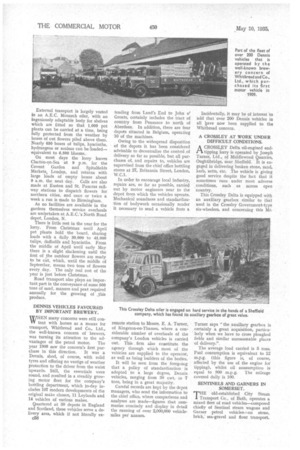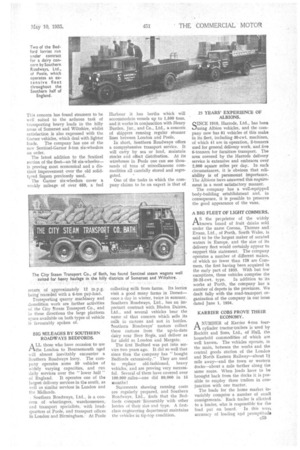DENNIS VEHICLES FAVOURED BY IMPORTANT BREWERY.
Page 116

Page 117

If you've noticed an error in this article please click here to report it so we can fix it.
VeEN many concerns were still connt with horses as a means for transport, Whitbread and Co., Ltd., the well-known concern of brewers, was turning its attention to the advantages of the petrol motor. The year 1909 saw the concern's first pur chase in this direction. It was a Dennis, shod, of course, with solid tyres and offering no vestige of weather protection to the driver from the waist upwards. Still, the essentials were sound, and resulted in a steadily growing motor fleet for the company's bottling department, which to-day includes 107 modern developments of the original make chosen, 11 Leylands and 14 vehicles of various makes.
.Quartered at 30 depots in England and Scotland, these vehicles serve a delivery. area, which if not literally ex
c58
remote station to Messrs. E. A. Turner, of Kingston-on-Thames, where a considerable number of overhauls of the company's London vehicles is carried Out. This firm also constitute the agency through which most of the vehicles are supplied to the operator, as well as being builders of the bodies.
It will be seen from the foregoing that a policy of standardization is adopted to a large degree, Dennis vehicles, ranging from 30 cwt. to 7 tons, being in a great majority.
Careful records are kept by the depot managers, who send the information to the chief office, where comparisons and analyses are made—figures that summarize concisely and display in detail the running of over 2,000,000 vehiclemiles per annum.
Turner says " the auxiliary gearbox is certainly a great acquisition, particularly when we have to cross ploughed fields and similar unreasonable places of delivery."
The average load carried is 5 tons. Fuel consumption is equivalent to 12 m.p.g. (this figure is, of course, affected by the use of the engine for tipping), whilst oil consumption is equal to 800 m.p.g. The mileage covered daily is 100.
SENTINELS AND GARNERS IN SOMERSET.
THE old-established City Steam Transport Co., of Bath, operates a mixed fleet of road vehicles—composed chiefly of Sentinel steam wagons and Garner petrol vehicIes—on stone, brick, sea-gravel and flour transport.
This concern has found steamers to be well suited to the arduous task of transporting heavy loads in the hilly areas of Somerset and Wiltshire, whilst satisfaction is also expressed with the Garner vehicles, which deal with lighter loads. The company has one of the new Sentinel-Garner 5-ton six-wheelers on order.
The latest addition to the Sentinel section of the fleet--an S6 six-wheeleris proving most economical and a distinct improvement over the old solidtyred Supers previously used.
The Garner six-wheelers cover a weekly mileage of over 650, a fuel return of approximately 12 m.p.g. being recorded with a 6-ton pay-load.
Tratsporting quarry machinery and demolition work are further activities of the City steam Transport Co., and in these directions the large platform space available on both types of vehicle L s favourably spoken of. Harbour it has berths which will accommodate vessels up to 1,500 tons, and it works in conjunction with Henry Burden, Jar., and Co., Ltd., a concern of shippers running regular steamer lines between London and Poole.
In short, Southern Roadways offers a comprehensive transport service. It will carry by sea or land, maintain stocks and effect distribution. At its warehouse in Poole one can see thousands of tons of miscellaneous commodities all carefully stored and segregated.
One of the tasks in which the company claims to be an expert is that of




































































































































































